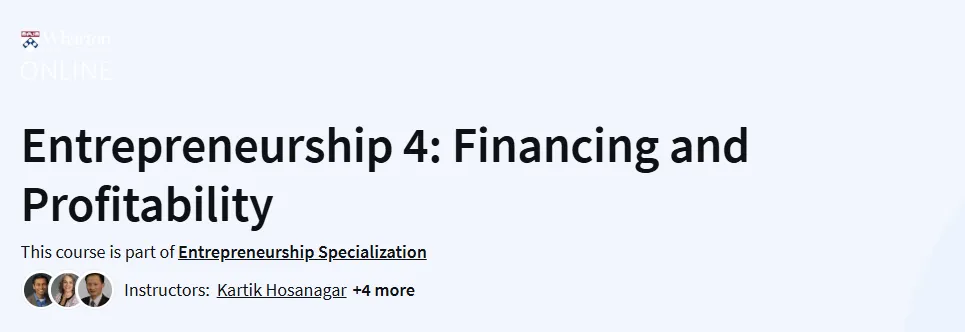What will you in Docker for the Entrepreneurship 4: Financing and Profitability Course
Explore various financing models, including bootstrapping, organic growth, debt, and risk capital.
Gain a comprehensive understanding of equity financing, covering key investor types such as angels, venture capitalists, and crowdfunding platforms.
Learn about term sheets, exit strategies, and how to determine the best exit mode for your venture.
Develop skills in business valuation, financial modeling, and crafting compelling pitch decks.
Program Overview
1. Business Models and Keeping Customers
⏳ Duration: 1 hour
Understand the importance of business models in achieving profitability and strategies for customer retention.
2. Financing, Valuation, and Terms
⏳ Duration: 1 hour
Delve into common financing methods, company valuation techniques, and the intricacies of term sheets.
3. Private and Public Financing, and Calculating Breakeven
⏳ Duration: 1 hour
Examine the pros and cons of public vs. private financing and learn to calculate breakeven points and burn rates.
4. Elements of the Pitch and Exit Strategies
⏳ Duration: 1 hour
Learn to craft effective pitches and explore various exit strategies, including IPOs and acquisitions.
Get certificate
Job Outlook
Equips learners for roles such as Entrepreneur, Startup Founder, and Business Development Manager.
Applicable in industries where understanding financing and profitability is crucial, including technology, healthcare, and finance.
Enhances employability by providing practical skills in financial planning and investor relations.
Supports career advancement in fields requiring expertise in entrepreneurial finance and strategic planning.
Specification: Entrepreneurship 4: Financing and Profitability
|
FAQs
- No finance degree required, just a willingness to learn.
- Explains concepts in simple, practical terms.
- Focuses on cash flow, funding, and profit sustainability.
- Designed for aspiring and early-stage entrepreneurs.
- Helps bridge the gap between business ideas and financial planning.
- Provides an overview of financing sources (loans, investors, bootstrapping).
- Explains how to evaluate which funding option fits best.
- Teaches how profitability influences funding opportunities.
- Emphasizes financial planning for sustainable growth.
- Offers insights but not direct access to investors or lenders.
- Helps in setting up cash flow and profit tracking systems.
- Teaches decision-making for managing costs and revenues.
- Provides tools to evaluate business sustainability.
- Useful for both startups and established small businesses.
- Encourages action-oriented strategies to boost profitability.
- Total duration approximately 10–12 hours.
- Self-paced learning with flexible schedules.
- Structured into digestible modules for better retention.
- Includes examples and exercises for application.
- Designed to balance theory with practical business tools.
- Teaches cost management and break-even analysis.
- Covers how to assess long-term profitability.
- Helps identify and avoid common financing pitfalls.
- Strengthens decision-making around funding and investments.
- Builds awareness of sustainable business growth strategies.





